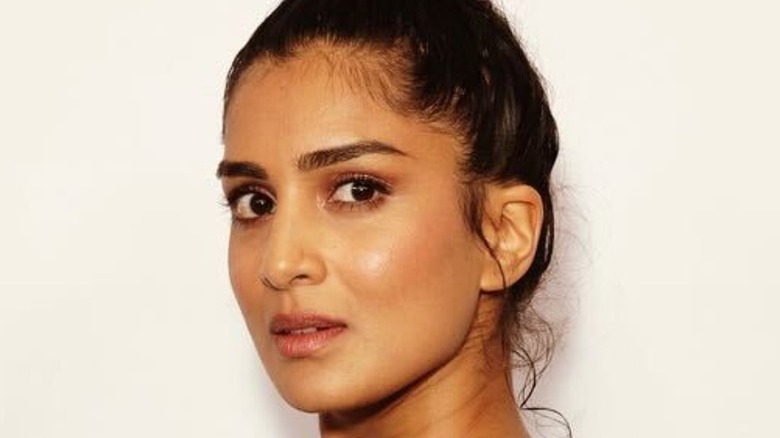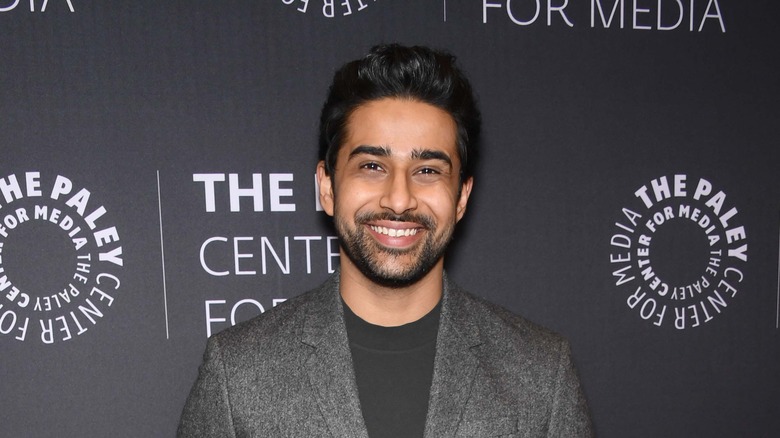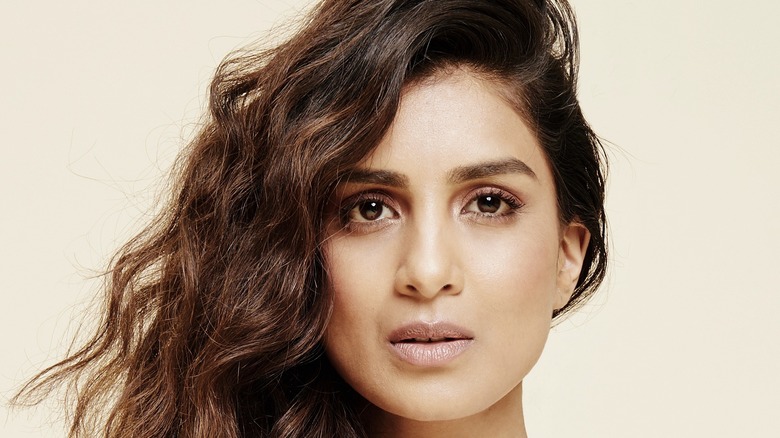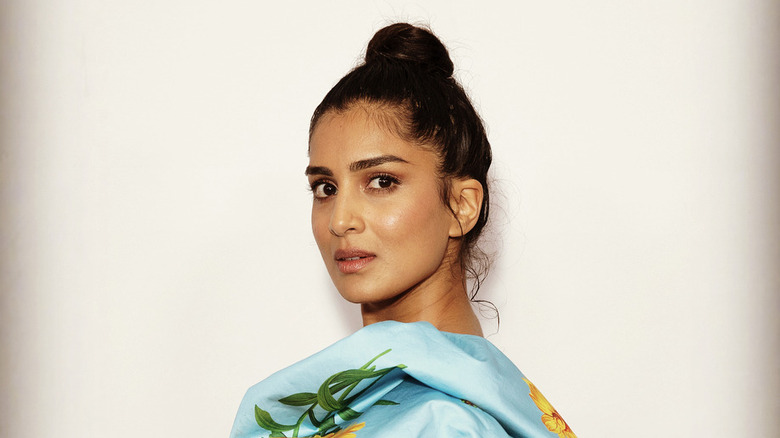Wedding Season's Pallavi Sharda And Suraj Sharma Talk Diversity On Screen - Exclusive Interview
Raise your hand if you've suddenly found yourself in the era of weddings and babies. What seemed just seconds ago were unruly college days, bottomless brunches that went until dinner, and frantic messages from your best friend which read, "Do NOT text your ex." Now — with the exception of some wild bachelorette weekends — life has seemingly hit adulthood square in the face, with the guy we all swore would be single forever getting married next week.
What happened, and why does our mom bring up the fact that we're still single every chance she can? If you relate to this sentiment in more ways than one and are looking to add another hit Netflix film to your list, turn your attention to "Wedding Season." Starring the dazzling Pallavi Sharda and "How I Met Your Father" star Suraj Sharma, "Wedding Season" brings two seemingly very different single souls together, sparking a connection that none of us saw coming.
Sharda's Asha, a successful, ambitious, single woman who's recently broken off her engagement, is suffering (not silently, we might add) at the hands of her mom, who is determined to set her up with a prince charming type. Sharma's Ravi, on the other hand, couldn't be more different, but the two connect with a shared goal: Get through wedding season in one piece. Ahead of the film's premiere, we sat down with Sharda and Sharma and dished about the film, the important diversity and culture they bring to the screen, and more.
Pallavi Sharda and Suraj Sharma reflect on the 'dual identity' presented in the film
I want to get into some of the intricacies of [this film]. Your characters could not be at further odds from one another, and yet they find themselves forced together thanks to their meddling parents. Before we get into some of the individual storylines, I'd love to explore what that dynamic was like and what it was about the story that initially attracted you both to the project.
Pallavi: I'll start with your second question first. I was initially drawn to the project by virtue of this script that was shown to me in which a South Asian woman was front and center and her journey was being explored with so much care and nuance. It was an opportunity to give voice to this dual identity that I have grappled with, that so many of my friends and my cousins, my uncles, my aunties have grappled with, [and] my nieces and nephews.
Dual heritage is very core to who I am as a person, as an Australian-born Indian woman. It's the same for Asha and for Ravi and all the characters in this film and even their parents. I feel like there's been a paucity of those stories told in mainstream film and television, and I could tell that this was happening with a level of specificity that is really important to show audiences, so that we can break down the monolithic stereotypes that are often attached to South Asian culture. What was it like to work with this guy? It was swell. I loved working with him.
Suraj: I loved working with her and it was so much fun. Being surrounded by people of South Asian descent in North America, making a movie together — that's not normal, you're usually alone. There was so much to it. You finally felt like, "Wow, there is a whole thing going on and I'm a part of it." It was so fantastic.
With regards to the second thing you're saying ... the first thing you said about them being so different from the common thread, this thing you said is all about this movie, in what we are trying to say, what we are trying to show, which is what she's saying too, which is a specific thing, right? The moment you become true to yourself, you're going to feel different from a lot of other people.
The fact of the matter is that the through line is being true to yourself, is being honest — in line with the movie, in line with the love that they fight and fall for, with regards with their relationship with their family and being honest.
Pallavi: Truth prevails.
Suraj: Truth prevails.
Pallavi Sharda dishes about her character's ambitious arch
It seems that in this day and age, the more authentic stories we can bring to the screen, the more it's going to resonate with viewers.
Suraj: 100%.
Pallavi: It's so easy. This is what sometimes has baffled me in my time as an actor and as a writer as well, is that actually giving voice to another person and collaborating is not a difficult thing if there's the will to do so. This project is the result of that will, and the results are incredible. We've been speaking to people all morning, and everyone has spoken about the resonance that they felt when they watched this. That is the difference — when you bring together people and allow them to talk about their lived experience, whether it's in a fictionalized way or not, it rings true.
When your character specifically broke off her engagement – she's a career woman, she's dedicated to paving her own way. Those are such tangible elements to a woman's story, that I know I can relate to that, my sister-in-law can relate to that, my friends, everyone. What was it about Asha's storyline and that eventual romance that won you over, and with that, what are you hoping women will take from that journey?
Pallavi: As you said, you relate to it, your sister-in-law relates to it. [With] a lot of my friends, I've seen this story unfold in front of me. While I haven't gone through that specific thing, I know the truth of it. That jumped out at me like, "This is real, this happens." It's often not talked about within the South Asian context, because there are so many taboos around a woman taking reins of her own life, particularly when it's around a broken engagement or a divorce or something like that.
These are stigmatized concepts in certain cultures, and often in Indian culture. For her to play with that and to play with that so naturally, and not have shame and guilt around those things, I loved the idea of portraying a woman who was independent of that shame and that guilt and was willing to stand up for herself from the get-go.
That's one thing we see about Asha from moment one, that she backs herself. I back myself, and I often have naysayers telling me what's up in my personal life, in my professional life. Ultimately, I've had to follow my intuition and my gut. I feel like Asha's journey is from a childhood Asha who trusted her gut and her intuition. She's somewhere, she's a little bit stuck when we find her. She's recalibrating and finding her way again into a part of herself that exists within her.
It's not a new part of herself, but what's amazing is that her heart opens up and she lets another person in to help guide her in that. There's humility and empathy and openheartedness and softness in that. I love the yin and yang of Asha's character and Ravi's character. They're not one or the other, and like the culture we're representing, they're not monoliths either.
The actors reflect on the 'freeing' experience of Wedding Season
I want to get into the South Asian, Indian culture that's brought to the screen a little more specifically. It's such a diverse storyline and so many of us can relate to it, but what was it like both on and off screen to work within that diverse community and to bring that culture into your work like this?
Pallavi: So special.
Suraj: It was freeing. Like we said, I've never been on a set with more than one other Indian. I've done this for so many years. It was freeing. You start realizing the amount of work and perseverance that has gone into this before you came into the scene at all. Where you stand, you might think, "Oh my God, I've done this, been through the trenches and whatnot." There are people for 30, 35 years who played essentially — most of the time — taxi drivers and 7-Eleven owners. They went through all of it and survived on their love for the craft and the hope for the future. It's mad.
Pallavi: It was really humbling to work with in that environment. I think of Veena [Sood], who plays my mom. She's Canadian-born, she has a Canadian accent when she actually speaks and was representing — in this film — a version of [South Asian women]. There's still no concept of the fact that someone from her generation could be Canadian-born and could be an unaccented Indian woman. In a sense, she's still pretzeling into that archetype. It's where we haven't gotten to the broad range of nuance, and there are so many stories within what it means to be a South Asian person of dual heritage. I feel like we came so much closer here on this journey.
Suraj: We'll get there.
Talk about standing on the shoulders of the people who came before you. That's a really profound experience, I'm sure.
Suraj: It was, and it's bolstering. It is suddenly deeply bolstering. When you're alone and doing something, and I'm sure ... Any kind of minority and women, who all relate to this, if you're the only person in the room of your whatever it is, and you're used to that, you feel like you're fighting and fighting constantly.
You spoke about that in "How I Met Your Father" and how there was some apprehension there about potentially being in a stereotyped role or only in that one specific lane.
Suraj: You're not alone, nobody is alone. We have climbed upon each other and survived, and that's how we keep on going, and that's beautiful. In regards to ["How I Met your Father"], what you just said, specificity is the only way we can understand one another. If we do broad strokes, it's just going to be for show. So that's the goal.
Pallavi: Optics versus actualization.
"Wedding Season" drops on Netflix on August 4.



